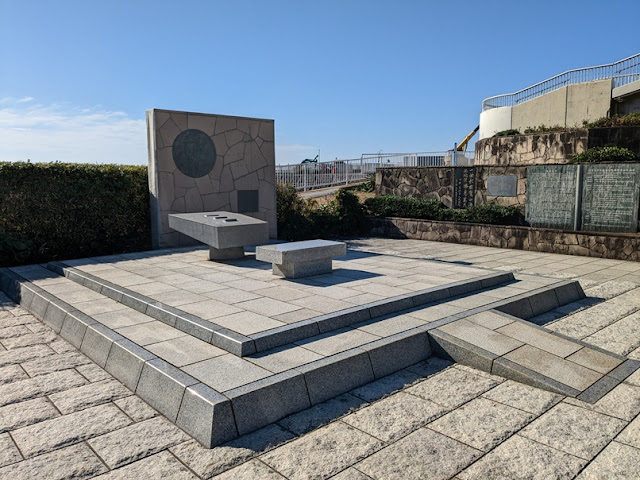The Nie Er Memorial Square (聶耳記念広場) in Shōnan Kaigan Park (湘南海岸公園)
 |
| Nie Er Memorial Square |
 |
| Cenotaph of Nie Er |
Nie Er, whose birth name was Nie Shouxin, was born in Kunming, Yunnan Province, China, on February 14, 1912.
In 1933, he became a member of the Chinese Communist Party.
In April 1935, after learning that the Chinese Nationalist authorities were planning his arrest, he fled to Japan, where his elder brother was living at the time. However, some accounts suggest that he was simply passing through Japan en route to the Soviet Union or Europe to study.
Shortly after his arrival in Japan, he composed the theme song for the patriotic Chinese film Children of Troubled Times (traditional Chinese: 風雲兒女; simplified Chinese: 风云儿女), directed by Xu Xingzhi. This song later became known as "The March of the Volunteers" (traditional Chinese: 義勇軍進行曲; simplified Chinese: 义勇军进行曲) — which would go on to become the national anthem of the People's Republic of China.On July 17, 1935, Nie Er went missing while swimming at Kugenuma Beach and was found dead the following day. His remains were returned to Kunming in October 1937, where he was laid to rest.
When the piece was adopted as the national anthem of the People's Republic of China in 1949, some residents of Fujisawa launched a campaign to commemorate Nie Er, leading to the construction of the cenotaph in 1954. The original monument was washed away by the Kanogawa Typhoon in 1958 but was rebuilt in September 1965.
 |
| Relief sculpture of Nie Er |
In 1986, a relief sculpture was added to the site, and the surrounding area was redeveloped into Nie Er Memorial Square (聶耳記念広場) to mark the 50th anniversary of his death. Every year on July 17, the Nie Er Memorial Preservation Society (聶耳記念碑保存会) holds a memorial ceremony.
 |
| Stone plaque engraved with Nie Er's biography and an overview of the Preservation Society's activities |
 |
| Stone plaque from Kunming |
"A single song serves the nation, astonishing the four seas; bridging two lands, bringing blessings to all people."
This plaque was a gift from the city of Kunming to celebrate the 30th anniversary of its sister-city relationship with Fujisawa.










Comments
Post a Comment